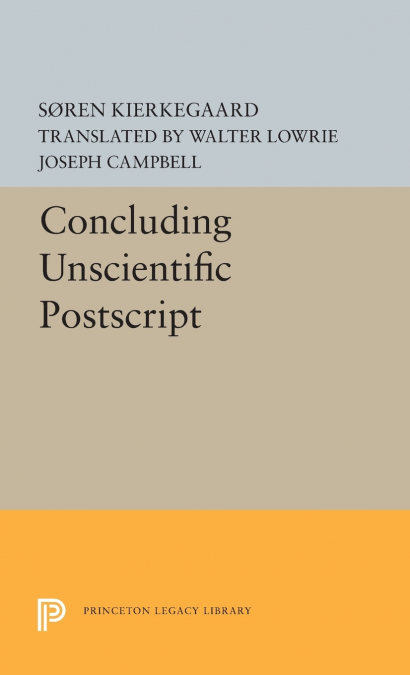
Søren Kierkegaard / Joseph Campbell / Walter Lowrie
 Librería Perelló (Valencia)
Librería Perelló (Valencia)
 Librería Aciertas (Toledo)
Librería Aciertas (Toledo)
 El AlmaZen del Alquimista (Sevilla)
El AlmaZen del Alquimista (Sevilla)
 Librería Elías (Asturias)
Librería Elías (Asturias)
 Librería Kolima (Madrid)
Librería Kolima (Madrid)
 Donde los libros
Donde los libros
 Librería Proteo (Málaga)
Librería Proteo (Málaga)
Contents include:ForewordEditor’s PrefaceIntroduction by the EditorPrefaceIntroductionBOOK ONE: The Objective Problem Concerning the Truth of ChristianityIntroductory RemarksChapter I: The Historical Point of View1. The Holy Scriptures2. The Church3. The Proof of the Centuries for the Truth of ChristianityChapter II: The Speculative Point of ViewBOOK TWO: The Subjective Problem, The Relation of the Subject to the Truth of Christianity, The Problem of Becoming a ChristianPART ONE: Something About LessingChapter I: An Expression of GratitudeChapter II: Theses Possibly or Actually Attributable to Lessing1. The subjective existing thinker has regard to the dialectics of the process of communication2. The existing subjective thinker is in his existential relation to the truth as negative as he is positive; he has a much humor as he has essential pathos; and he is constantly in processof becoming, i.e. he is always striving3. Lessing has said that accidental historical truths can never serve as proofs for eternal truths of the reason; and that the transition by which it is proposed to base an eternal truth uponhistorical testimony is a leap4. Lessing has said that, if God held all truth in His right hand, and in His left the lifelong pursuit of it, he would choose the left handA. A logical system is possibleB. An existential system is possiblePART TWO: How the Subjectivity of the Individual Must be Qualified in Order that the Problem May Exist for HimChapter I: The Task of Becoming Subjective. The conclusion that would be forced upon ethics if the attainment of subjectivity were not the highest task confronting a human being-Considerations left out of account in connection with the closer understanding of this-Examples of thinking directed towards becoming subjectiveChapter II: The Subjective Truth, Inwardness; Truth is SubjectivityAppendix. A Glance at the Contemporary Effort in Danish LiteratureChapter III: Real or Ethical Subjectivity-The Subjective Thinker1. Existence and Reality2. Possibility as higher than Reality-Reality as higher than Possibility-Poetic and Intellectual Ideality-Ethical Ideality3. The Simultaneity of the Individual Factors of Subjectivity in the Existing Subject-The Constrast between this Simultaneity and the Speculative Process4. The Subjective Thinker-his Task, his Form, his StyleChapter IV: The Problem of the Fragments: How can an Eternal Happiness be based upon Historical Knowledge?Section I. For Orientation in the Plan of the Fragments1. That the point of departure was taken in the pagan consciousness, and why2. The importance of a preliminary agreement concerning what Christianity is, before there can be any question of mediating between Christianity and speculative thought. The absence of suchan agreement favors the proposal of medication, while at the same time making any mediation illusory; the presence of such an agreement precludes mediation3. The problem of the Fragments viewed as a problem, introductory not to Christianity, but to becoming a ChristianSection II. The Problem Itself. The eternal happiness of the individual is decided in time through the relationship to something historical, which is furthermore of such a character as to oinclude in its composition that which by virtue of its essence cannot become historical, and must therefore become such by virtue of the absurdA. Existential Pathos1. The Initial Expression for Existential Pathos: the absolute direction (respect) toward the absolute telos, expressed in action through the transformation of the individual’s existenceAesthetic Pathos-The deceptiveness of the principle of mediation-The medieval monastic movement-The simultaneous maintenance of an absolute relationship to the